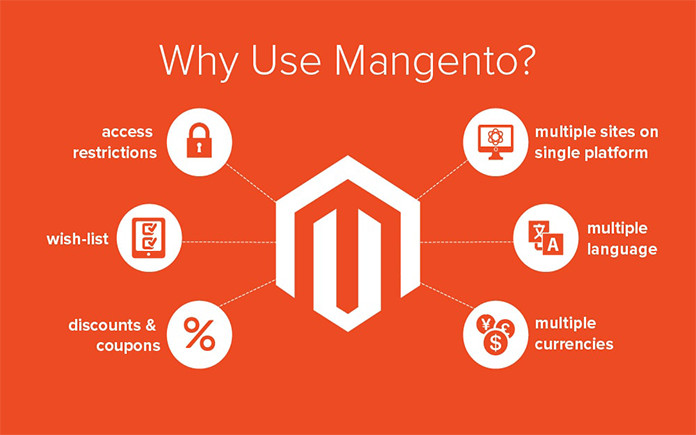If you are on the hunt for the best e-Commerce platform to ensure your business thrives, then you might be overwhelmed with all the choices out there. We are sure you’ve seen Shopify, WooCommerce, and Magento E-Commerce as some of the most highly recommended platforms. And you know what? Your e-Commerce platform is more valuable today than you could have ever imagined. Retail eCommerce sales are predicted to hit $5.5 trillion dollars in 2022. Naturally, you want to be a major player in those numbers.

Photo Credit to Digiexe
Online shopping might even just be the preferred way of shopping considering the times we’ve been through. It has pretty much been a surprising ride for all of us! The only way to participate in these growing sales is by having a website, an awesome website. Not just any website will do, but a great, fluid, and seamless website. Now, you must be wondering why we believe Magento stands out among its competitors. In this article, we’ll explore what Magento is, how it compares to Shopify and WooCommerce, its desirable features, and more. Let’s get into the juicy stuff!
What is Magento eCommerce?
Magento is an open-source eCommerce platform with built-in PHP. For this reason, some of the biggest brands like Nike and Samsung have opted to use Magento as their home-based platform. To us, that says a whole lot. This platform isn’t for rookies, but for those who really know their way around the hard corners of the internet and their computers. Magento requires a programmer and a specialized developer, but obviously, Nike and Harper’s Bazar found it worth it, and maybe you should too. Magento is for true professionals who want to develop a long-term eCommerce website. This platform was really designed with professionals in mind.
Since Magento is an open-source platform it gives you the possibility to customize your website to something that really stands out from the crowd. It’s flexible and adaptable, which means it can grow and change with the changing times and trends. We all know how quickly things are changing, and our businesses will need to keep up with the ebbs and flows of the market. The basic version of Magento is totally free and its capacity and capabilities make it a great choice for retail stores and large-scale businesses whose goal is to grow in the next few years.

Photo Credit to Daqiantimes
Magento vs Shopify
Everyone wants to know what is the difference between Shopify and Magento and how the two compare. Creating, managing, and maintaining your online store each comes with its own advantages and challenges. Magento and Shopify are fairly different from one another and each one is more suited for particular types of businesses. The two are among some of the biggest players when it comes to building your eCommerce website, so it’s no surprise we placed them shoulder to shoulder.
How Shopify Compares to Magento:
- Shopify is more suited for beginners
Shopify is a simple and ready-to-use platform, with a straightforward interface. Magento on the other hand is best for advanced developers so that you can really get the most out of all of their features. Magento is the choice for large businesses that have a developer on their team or for someone who knows the CSS and HTML ropes.
- Shopify does the hosting
Shopify will do the hosting for you, whereas with Magento, you’ll have to source your own host. You’ll need some web development and web programming skills before you’re able to launch your site on Magento. Shopify would be the quick and easy solution, whereas Magento would really offer you complete control over all the details of your site and how it runs. We like to refer to it as the more complex brain if you get what we mean.
- Shopify is a Paid-for Platform
To run Shopify you’ll need to pay for your features and themes. Magento on the other hand is free and open-source software. Once you get started with Magento, the prices will start rolling in. If you’re on a really tight budget, then Shopify will be the better choice for you. If however, you have the budget to run a top-notch website, we recommend going with Magento.
Shopify Pros and Cons
Shopify is easy and ready to use, which means you can start running your website pretty quickly. They have hundreds of themes to choose from with an abundance of apps and extensions to further improve your website and functionality. Many merchants find the apps more confusing and overwhelming though, plus most of those apps come with an added cost. There are a few free themes, but only the paid premium themes come with around-the-clock customer support. The free themes are an okay option for those just starting out on a really tight budget but are not for those serious about growing their business. There’s also a fee for every transaction that is fulfilled on your website. Really makes you wonder, doesn’t it…
Magento Pros and Cons
Magento comes fully equipped with an awesome community that can help and support new users. There are so many customizable options, that you really get the opportunity to build the website of your dreams. We really can’t underestimate the power of one’s website. It is where we can generate hundreds, if not thousands, of sales, if and when done right. We are talking weekly here, especially for bigger businesses. Furthermore, the platform is flexible, with an excellent range of themes to choose from.
You won’t need to do much coding when it comes to Magento commerce and it comes with fantastic extensions. Let’s not forget it’s a free open-source network, which is what attracts so many merchants to this platform. Magento however, will take some time to learn. You’ll need to prepare yourself for the learning curve Magento has to offer. This only means you’ll understand your website through and through and by the end of it will probably be able to fix anything you don’t like in the future. It’s only an added skill. At least that’s how we approach it.
Is Magento Easy to Learn and Use?
As you may have already figured out, Magento isn’t for newbies. It takes a little knowledge to really know how to work the ins and outs of Magento. If you have some developing skills or have someone on your team that does, then we’d highly recommend going for Magento. It comes highly recommended for those who want to grow their business and enter the big rat race of the eCommerce market.
There are many great tutorials out there and a lot of support you can receive if you choose to go with Magento. You will need basic HTML and CSS knowledge to get started with Magento, which many of us already have. You also need to have the interest and desire to learn how to build and manage a website from the ground up. This is for someone who wants real control over the outcome of their website.
Is Magento a Good Platform for eCommerce?
Magento was launched in 2008 by Varien and developed by the very well-known Zend Framework. Several users switched over to Magento by 2020, and this platform was rated among the top three migrated-to platforms.
Here are some of Magento’s Top Features:
- Extremely SEO Friendly
When you’re building your first website, or looking to build a better website than what you already have, your SEO is everything. Well, it’s almost everything. Your Search Engine Optimization is what will bring your customers and sales to your website. Without SEO your products and brand would just get swallowed inside the great big space of the internet. That will not do much for sales, no it certainly will not.
SEO features:
- Search friendly URLs
- Enhanced XML sitemaps
- Canonical tag for removing duplicate content
- Meta title and meta description for the product, category, and content pages
- Layered navigation
- Internal links using WYSIWYG
- Customizable H1 tag
- Robot.txt

Photo Credit to Cornershopcreative
- Mobile Friendly
So much online shopping will take place on your customer’s phones. This means you need to ensure your website is functioning at the top rate and top speed on mobile devices. Magento offers cross-platform and cross-browser compatibility. This platform also offers image scaling and AV capabilities, so that your shoppers are able to seamlessly shop on your website from their mobile devices.
- Scalability
If you’re in need of a highly scalable platform for your growing business, then Magento is your go-to platform. You’ll always be able to customize or add new features to your website at any point as you sell your products on the market. What this means is that as your business grows, your website will be easily updated according to the demands of your market. As soon as your business really kicks off and makes a large number of sales, you’ll really experience the added benefits of Magento.
- Catalog Management
Your catalog contains all the products you have to offer to your customers and future customers. Magento offers extensive catalog management features that will make it easy-breezy for you to organize and sell what’s in your stock. This platform’s features will ensure you can market virtual products, it gives you the ability to edit and delete product reviews, and gives you total inventory management capabilities. You’ll be able to offer downloadable digital products like music, images, and videos, and it offers RSS feeds. Guess what? That is just the tip of the iceberg.
- Advertising and Marketing Tools
You will find all the help you need when it comes to promotions, marketing, and conversions. With Magento, you will be able to cross-sell your products, send off coupon codes to your customers, and offer price variations based on your customer’s high and heavy orders.
- Check Out and Shipping
You don’t want your customers’ products sitting in their shopping carts, totally neglected and abandoned. In order to prevent a loss of sales, Magento has a few tricks up its sleeves to keep your sales up. Magento checkout and shipping features include one-page checkout, the possibility to ship multiple orders at once, and let’s not forget about their top-notch security. Furthermore, It’s integrated with PayPal and offers all types of shipping alternatives. We really do like Magento.

Photo Credit to Sugerendo
Magento vs WooCommerce
Now onto the next big competitors. How can one choose between WooCommerce and Magento for their eCommerce store? Well, Magento and WooCommerce, the leading platforms in eCommerce, are both open-source networks. The two have a few similarities but are vastly different in other areas. Magento was really designed with professionals in mind, which is why Swatch and Coca-Cola are also using Magento. If you’re planning on running a big operation and need advanced functionalities, then Magento is your platform. WooCommerce on the other hand is a plug-in that works with WordPress to give you that final product website. Speaking of plug-ins, let’s have a side-by-side comparison of the two.
Comparing Magento with WooCommerce
Set-Up Time
In order to set up your shop on WooCommerce, you’ll need some basic technical skills and know-how to work with WordPress. What sort of prior knowledge you start your website with, will contribute to how much time you’ll need to get the site up and running. Magento is really for tech-savvy users and can require much more time if you’re just learning the field.
Plugins and Extensions
WooCommerce offers thousands of plug-ins and extensions, but at a price. They aren’t priced unreasonably, but they don’t come for free. Magento on the other hand offers almost 20k free extensions, and they also offer various extensions at a fee.
Designs and Themes
When it comes to WooCommerce you’ll be working with one theme that you’ll be able to manipulate and customize. Their themes will cost you around $79, whereas a Magento theme usually ranges anywhere from $20-$300. Again, the costs will really depend on your needs and desires.
Built-In Features
WooCommerce offers a variety of SEO built-in features. On the flip side, Magento offers built-in inventory, built-in scales, built-in SEO, and built-in analytics features. Magento makes it possible to add extensions so that you can customize your site even more than you may have dreamed of. It’s obvious who takes the lead on this one, wouldn’t you agree?

Photo Credit to Pexels
Security
Magento comes with a much tighter security protocol. They have a two-factor authorization with their Magento 2 and really run a tight ship over there. WooCommerce leaves it to your web hosting provider to set up and scan that security check. Did you know that 51% of consumers are said to leave a website if the website is marked as ‘Not Secure? Magento has a site security scanner, an SSL security certificate to earn the trust of your consumer, and around-the-clock server monitoring. Could that be why Moschino has also gone with Magento?
Payment Methods
Both WooCommerce and Magento don’t charge transaction fees. Woocommerce offers 4 different payment methods and 3 different payment gateways. Magento on the other hand, offers 6 payment methods, including online card payment, check/money order, cash on delivery, bank transfer, purchase order, and zero subtotal checkout. Magento hosts 2 payment gateways, including Paypal and authorize.net.
Takeaway:
By now you should have a really clear idea of what it would be like to build your eCommerce shop using Magento. Some of the main points you can draw from this information are that Magento is really the platform for the big fish, or for those who want to grow to become one of the big fish. It’s a free open-source platform that certainly isn’t your cheapest option after you run all the add-ons and necessary features to make your website stand out among the rest.
Furthermore, if you aren’t familiar with developing and programming, and you want to use Magento, and refuse to use any other platform, then either you are going to have to learn how to work with it, or hire someone who does. There are plenty of knowledgeable individuals who know exactly how to work with Magento and can build you a website that will boost sales and attract a wide range of new customers. However, you should be aware of the fact that a website, which could bring in thousands of sales per month (or week!), certainly comes with a price tag. Do you think Magento is right for you? Get in touch with our team of professionals who can help you decide what platform is best for your business and what you need to get the ball (as in Moneyball) rolling.
Other related articles you might like to read:
- REASONS TO CHOOSE SHOPIFY WEBSITE BUILDER FOR E-COMMERCE
- 10 BEST SHOPIFY BUILDER THEMES FOR EVERY SITE 2022
- HOW TO START A SUCCESSFUL ECOMMERCE BUSINESS
References:
- Ethan Cramer-Flood, (Feb 2022) https://www.emarketer.com/content/global-ecommerce-forecast-2022
- Joydeep Bhattacharya, (Sep 2021) https://techbullion.com/why-magento-is-the-best-platform-for-ecommerce/
- Tutorials Point (2022) https://www.tutorialspoint.com/magento/index.htm
- Rapid Web Services, (2022) https://comodosslstore.com/resources/51-of-users-say-they-would-leave-a-website-marked-not-secure-immediately/








